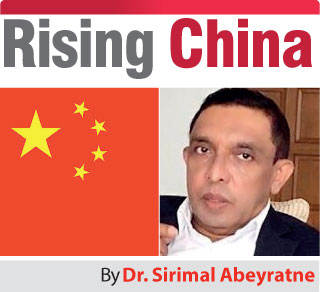Thursday Feb 19, 2026
Thursday Feb 19, 2026
Wednesday, 16 March 2022 01:00 - - {{hitsCtrl.values.hits}}

Chinese efforts in reducing air pollution were successful during the past two decades
This paper is based on the interview with Dr. Pradeep Perera, an Energy and Environmental Economist of the Asian Development Bank, on ‘Rising China and Lessons for Sri Lanka’. The interview series was launched by the Veemansa Initiative – an independent think tank in the areas of economic, political and social issues. Through this interview series, Veemansa brings about the views of intellectuals and experts on various dimensions of the miraculous development experience of China, by drawing lessons, parallels and prospects for
Sri Lanka.
 Development is the enhancement of the quality of people’s lives in a sustainable manner. When a nation improves the living conditions of its people from generation to generation, it also has a negative impact on their natural environment because they extract resources from the environment. As this process is continuous, people would end up with a degraded natural environment where it does not support any longer for the wellbeing or even the survival of the future generations.
Development is the enhancement of the quality of people’s lives in a sustainable manner. When a nation improves the living conditions of its people from generation to generation, it also has a negative impact on their natural environment because they extract resources from the environment. As this process is continuous, people would end up with a degraded natural environment where it does not support any longer for the wellbeing or even the survival of the future generations.
Sustainable development
Therefore, today our focus is not just on the concept of development, but “sustainable” development through which we achieve development but ensure that our natural environment is available for our future generations as well. Circular economy and ecological civilisation are two terms that are associated with sustainable development.
The concept of “circular economy” applies to economic activities which extract natural resources but leave no waste in the production process; it is superior to the concept of “recycling wastage” through which there will be waste left out and it may be recycled. “Ecological civilisation” is a concept used by China in its 13th Five-Year Plan (2011-2015) in order to ensure that natural environment and human civilisation of the society continued to be preserved for future generations.
The current generations living in the world today are paying for the “climate change” that has been caused by the development process initiated by our former generations. In the industrial revolution that commenced in Europe about 400 years ago and, spread to the United States and other parts of the world, was based on the use of fossil fuel such as oil and gas as energy sources and the invention of the combustion engine to run with that. Its biproduct is carbon dioxide concentration over the planet contributing to increased global warming as we called it “greenhouse effect”. The problem is that once carbon dioxide is emitted, it remains in the atmosphere of the earth so that the carbon emitted 200-300 years ago remains on our earth.
Scientists have noticed the concentration of the greenhouse effect since the early 1900s, and its consequences. Today, the planet earth is warmer than it was during the pre-industrial era, while its consequences can be seen in terms of increased ecological imbalance, melting of glaciers, changes in weather patterns and many other; today, the world is talking about “climate refugees” who have lost their habitat due to global warming.
From an economic point of view, climate change has become one of the important sources of market failure. Everybody things that somebody else has to take actions to combat climate change, but there is no incentive for anybody to do so. If somebody does, it has a cost; but the irony is that its benefit is for everybody. Therefore, it should be a collective effort as the world has recognised now.
|
Dr. Pradeep Perera
|
Chinese initiatives
At the early stages of rapid economic development in China with its policy reforms after 1978, environmental pollution in China has been a major problem; cities like Beijing were considered among the top cities in the world with highest air pollution caused by industrialisation. However, China recognised this issue quite early and, took initiatives starting from its 12th Five-Year Plan (2006-2010).
Primarily, China set the targets for energy intensity, which is the amount of energy used per unit of output (GDP), in order to reduce it by 25% in the planned period of five years. While the large energy-consuming industries were given the mandate to come up with their own business plans to achieve the targets for which they were held accountable.
In the next Five-Year Plan, in addition to energy-intensity, China introduced the targets for the companies to reduce carbon-intensity per unit of output. Unlike most of the other countries in the world, China’s industrial share of GDP is about 50%, which is one of the reasons for its environmental pollution as well. After 2015, actually, China initiated measures to reduce its industrial share of GDP, by improving the service sector share. As a result, heavy export-dependence of the Chinese economy was reduced by increasing domestic consumption of the services sectors. More importantly, the services sectors consume less energy than the industrial sectors, contributing to the national effort of reducing energy-intensity and carbon-intensity in the economy.
Traditionally, the Chinese government declared a program called “war on pollution” in order to reduce air pollution caused by coal as a source of energy. In fact, China took drastic measures to combat air pollution, including a closure of a large number of coal-fired industries and power plants. In these kinds of programs, one important character was the delegated responsibilities from central government to local levels, holding the government agencies and bureaucrats accountable for achieving the targets.
Chinese efforts in reducing air pollution were successful during the past two decades. China, being the major carbon-emitting country in the world, while the USA is the second and India is the third, has recognised its responsibility to be the major player in the world in combating global warming as well. Although, coal-fired energy accounts for 60% of energy production in China, it has been now pushing towards renewable energy. China is also becoming the number one country in the world to develop various machinery for renewable energy production.
Lessons for Sri Lanka
In the case of Sri Lanka, in spite of much effort, industrialisation and economic development are still at their early stages. As a country, it is not connected that much with the global value chains. The country is not yet broken out of the initial labour-intensive industries such as the apparel sector, while these are not much energy-intensive industries either. As a result, our environment has not been severely damaged by industrialisation. Mining activity, which is strongly connected with industrialisation, is also not an important industry in Sri Lanka. Sri Lanka’s energy consumption as well as carbon emission remains quite low.
Compared to big countries such as China or India and even most of the other Asian countries, Sri Lanka is primarily a service-oriented economy; compared to industrial activities, service sectors do not harm the natural environment, which is a positive outcome. Given the strategic geographical location of the country and its low resource-base, the service sector is likely to play a major role even in our future development drive.
Although Sri Lanka does not have to worry about its own contribution to climate change which is marginal, it has to take into account the negative impact of global warming seriously and build up resilient economy and adopt safeguards against it. Going with the current global trends, Sri Lanka has to shift away from fossil fuel-based to renewable energy sources.
However, along these lines, Sri Lanka has much more to do with its regulatory reforms, land allocation, procurement procedures, incentive structure, corruption and the rule of law in order to establish a coherent environmental and energy strategy. It is the main lesson that Sri Lanka can learn from the Chinese experience.
(The writer is a Professor in Economics at the University of Colombo who conducted the interview series on Rising China.)